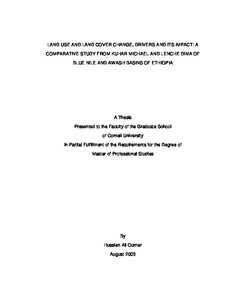Location
Cornell is a privately endowed research university and a partner of the State University of New York. As the federal land-grant institution in New York State, we have a responsibility—unique within the Ivy League—to make contributions in all fields of knowledge in a manner that prioritizes public engagement to help improve the quality of life in our state, the nation, the world.
Members:
Resources
Displaying 21 - 25 of 27Land use and land cover change, drivers and its impact: A comparative study from Kuhar Michael and Lenche Dima of Blue Nile and Awash Basins of Ethiopia
Land use and land cover change is driven by human actions and also drives changes that limit availability of products and services for human and livestock, and it can undermine environmental health as well. Therefore, this study was aimed at understanding land use and land cover change in Lenche Dima and Kuhar Michael of Amhara region, Ethiopia. Time-series satellite images that included Landsat MSS, TM, ETM+ and ASTER, which covered the time frame between 1972/3 to 2005, were used.
Designing index based livestock insurance for managing asset risk in northern Kenya
This paper describes a novel effort at developing index-based insurance for locationaveraged livestock mortality as a means to fill an important void in the risk management instruments available to protect the main asset of pastoralists in the arid and semi-arid lands of Kenya, where insurance markets are effectively absent and uninsured risk exposure is a main cause of the existence of poverty traps.
Altering poverty dynamics with index insurance: northern Kenya’s HSNP+
Abstract not available.
Contract farming in developing countries
Contract farming may be defined as agricultural production carried out according to a prior agreement in which the farmer commits to producing a given product in a given manner and the buyer commits to purchasing it. Often, the buyer provides the farmer with technical assistance, seeds, fertilizer, and other inputs on credit and offers a guaranteed price for the output. Proponents of contract farming argue that it links small-scale farmers to lucrative markets and solves a number of problems small-scale farmers face in diversifying into high-value commodities.






